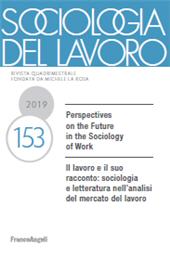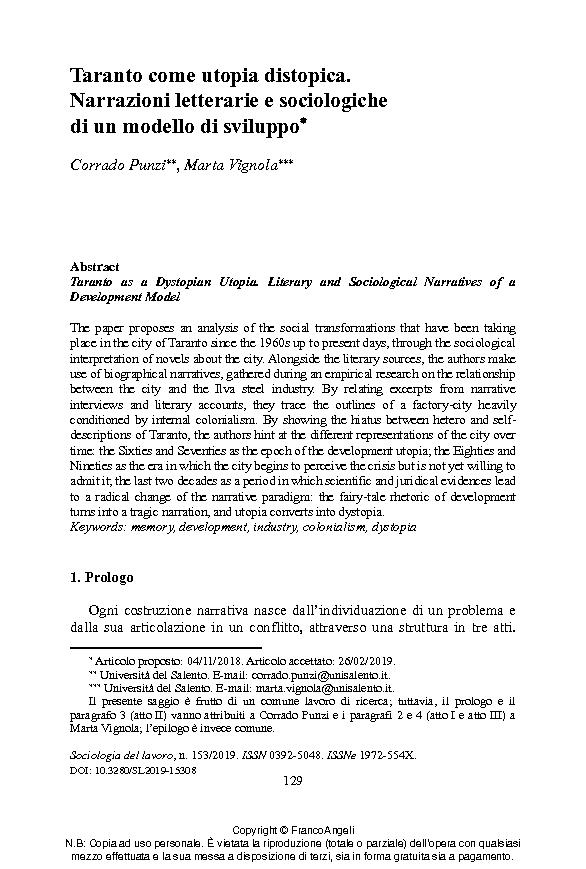Taranto come utopia distopica : narrazioni letterarie e sociologiche di un modello di sviluppo
129-148 p.
Il contributo propone un'analisi delle trasformazioni socio-economiche avvenute nella città di Taranto negli ultimi decenni, attraverso una lettura sociologica di alcuni opere letterarie di autori tarantini. Accanto alle fonti letterarie faremo uso di racconti biografici, risultato di un segmento di ricerca empirica sul rapporto tra la comunità tarantina e il siderurgico Ilva. Mettendo in relazione stralci di interviste narrative e resoconti letterari, si tracceranno i contorni di una città-fabbrica "sequestrata" da forme di sviluppo coloniale. Mostreremo lo iato esistente tra etero e auto-descrizioni di Taranto e vedremo come, in base ai diversi periodi storici, possano emergere differenti immagini del volto della città. Racconteremo gli anni Sessanta e Settanta come epoca dell'utopia dello sviluppo; gli anni Ottanta e Novanta come l'epoca in cui la città inizia a percepire la crisi ma a non volerla riconoscere neanche a se stessa;
e, infine, gli ultimi due decenni come periodo in cui le evidenze scientifiche e giuridiche portano a un radicale cambio di paradigma narrativo: la narrazione fiabesca raccontata negli anni del boom economico viene trasformata in una narrazione tragedica, che se fosse stata vista in origine sarebbe apparsa come una incredibile distopia. [Testo dell'editore].
The paper proposes an analysis of the social transformations that have been taking place in the city of Taranto since the 1960s up to present days, through the sociological interpretation of novels about the city. Alongside the literary sources, the authors make use of biographical narratives, gathered during an empirical research on the relationship between the city and the Ilva steel industry. By relating excerpts from narrative interviews and literary accounts, they trace the outlines of a factory-city heavily conditioned by internal colonialism. By showing the hiatus between hetero and self-descriptions of Taranto, the authors hint at the different representations of the city over time: the Sixties and Seventies as the epoch of the development utopia; the Eighties and Nineties as the era in which the city begins to perceive the crisis but is not yet willing to admit it;
the last two decades as a period in which scientific and juridical evidences lead to a radical change of the narrative paradigm: the fairy-tale rhetoric of development turns into a tragic narration, and utopia converts into dystopia. [Publisher's text].
Ist Teil von
Sociologia del lavoro : 153, 1, 2019-
Artikel aus derselben Ausgabe (einzeln erhältlich)
-
Informationen
ISSN: 1972-554X
KEYWORDS
- Memoria, sviluppo, industria
- Memory, development, industry, colonialism, dystopia



